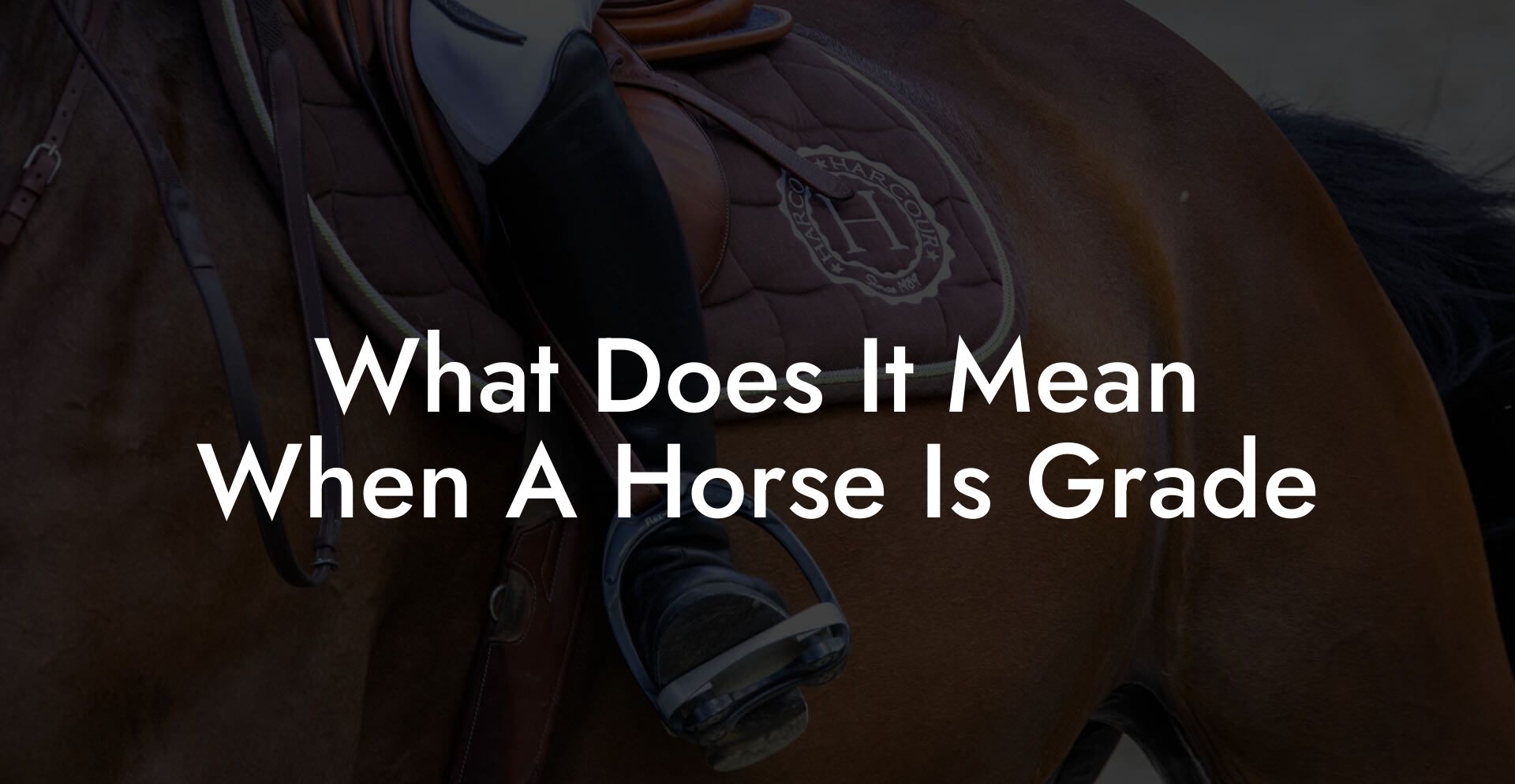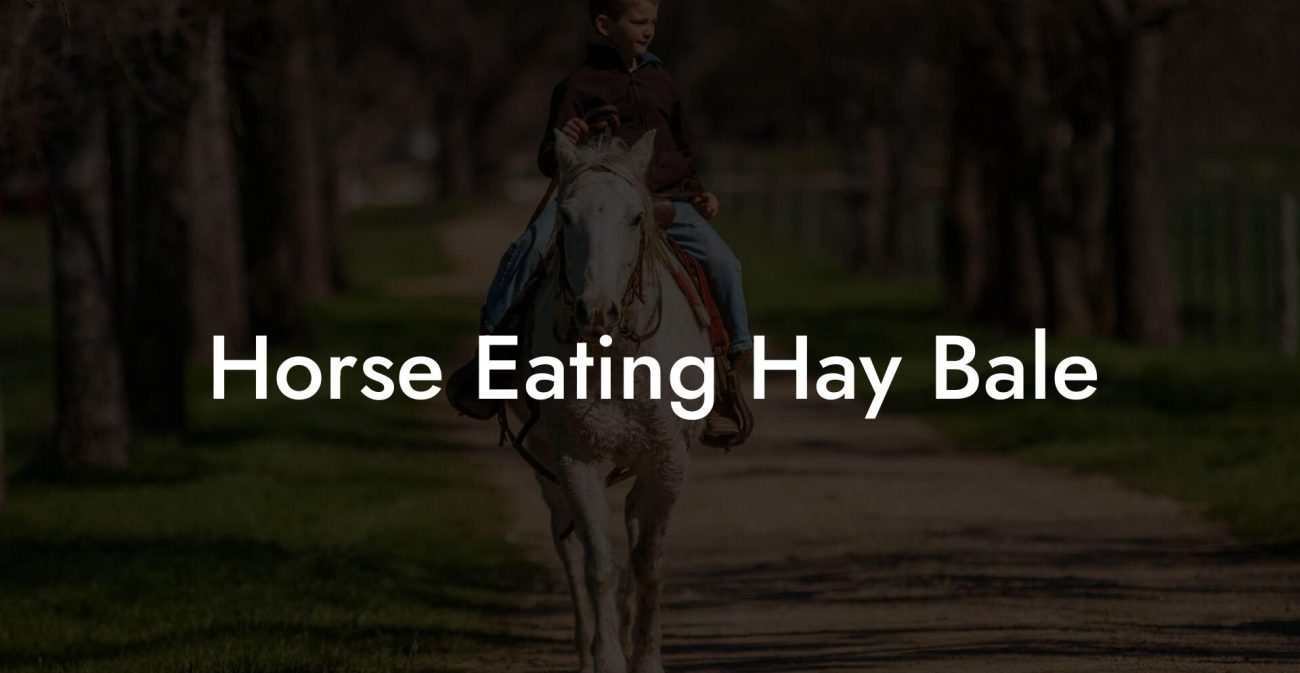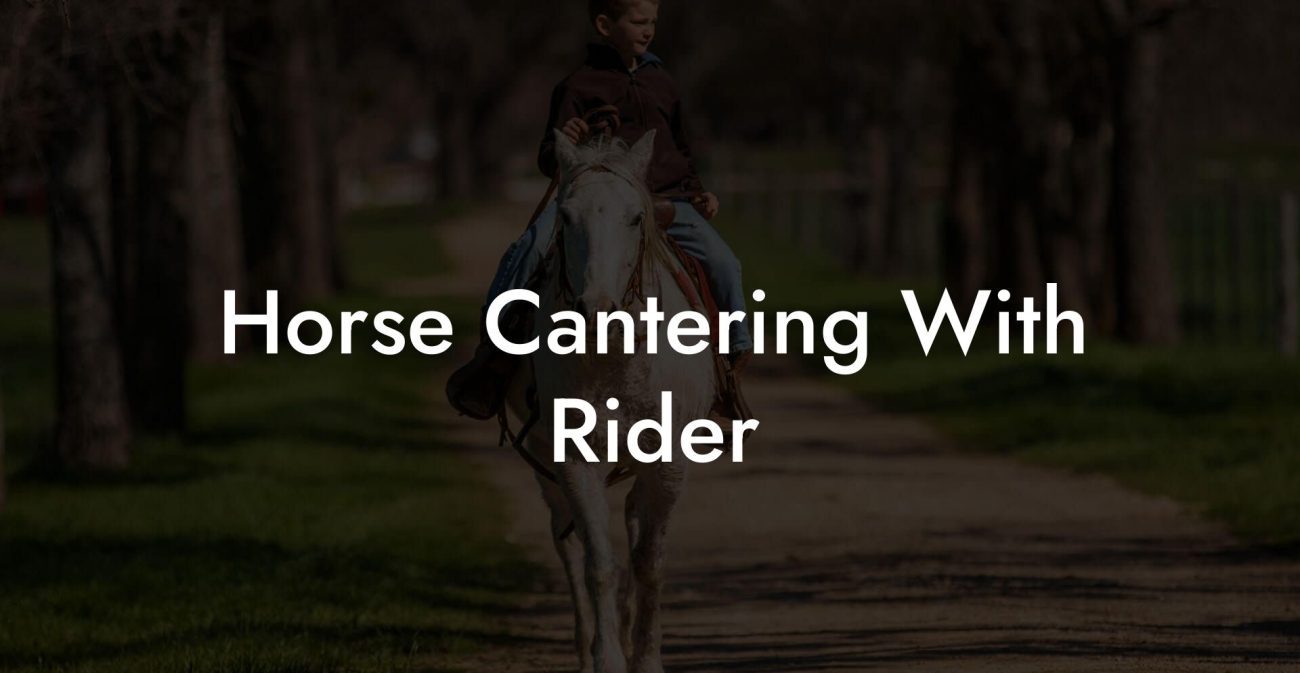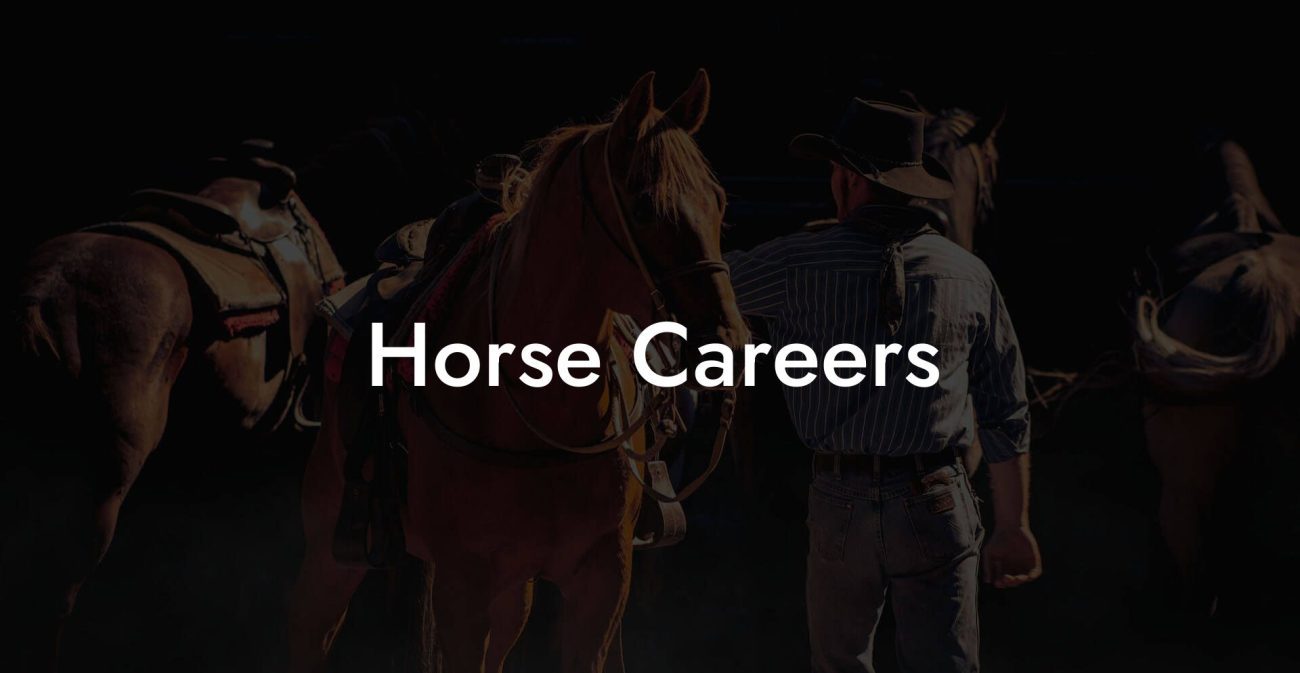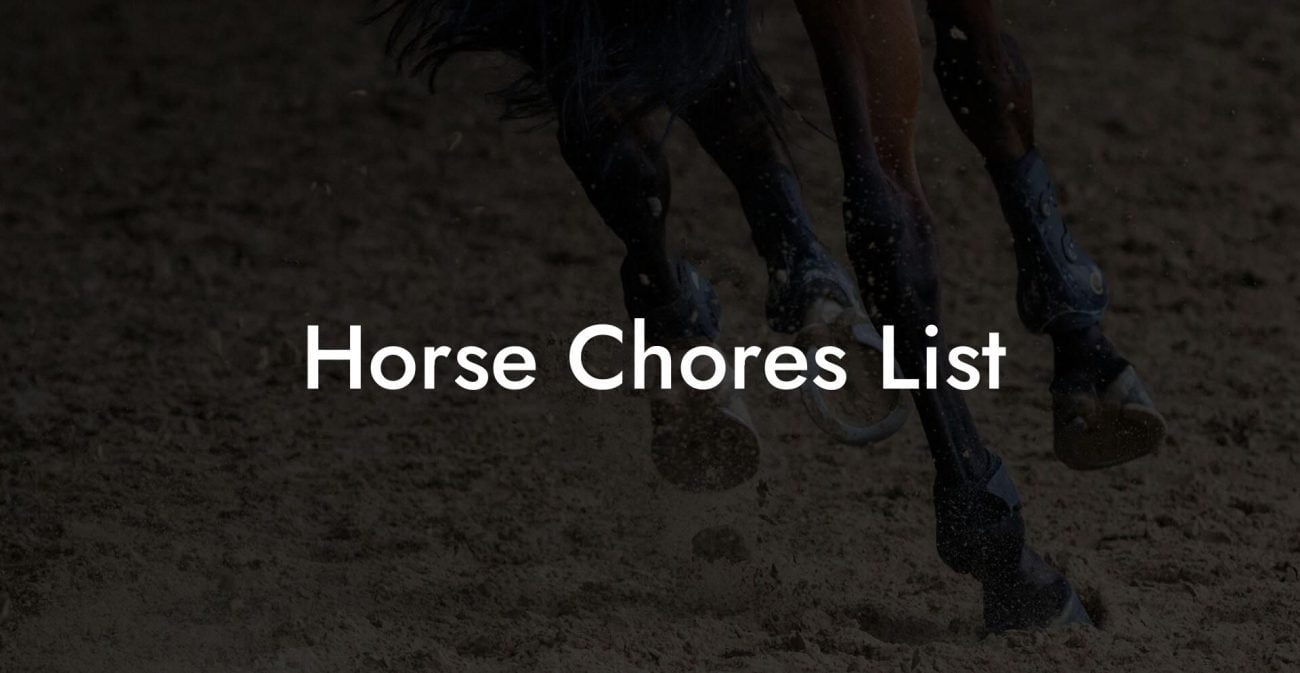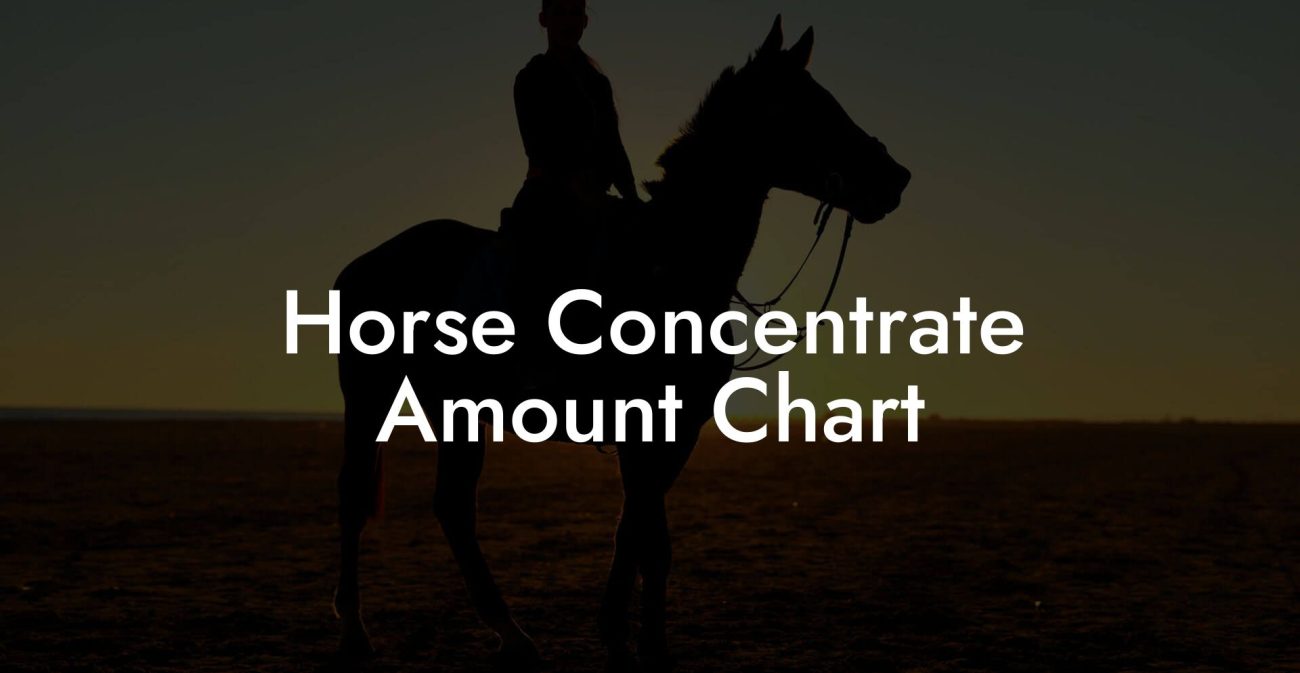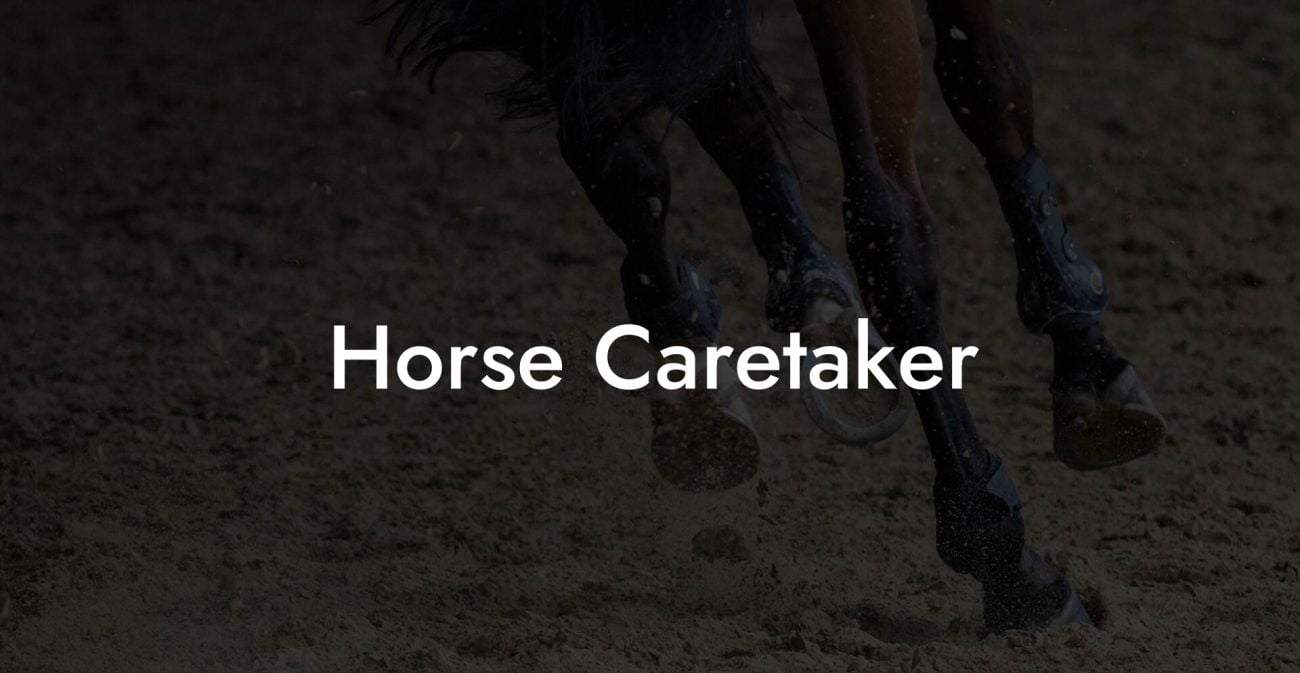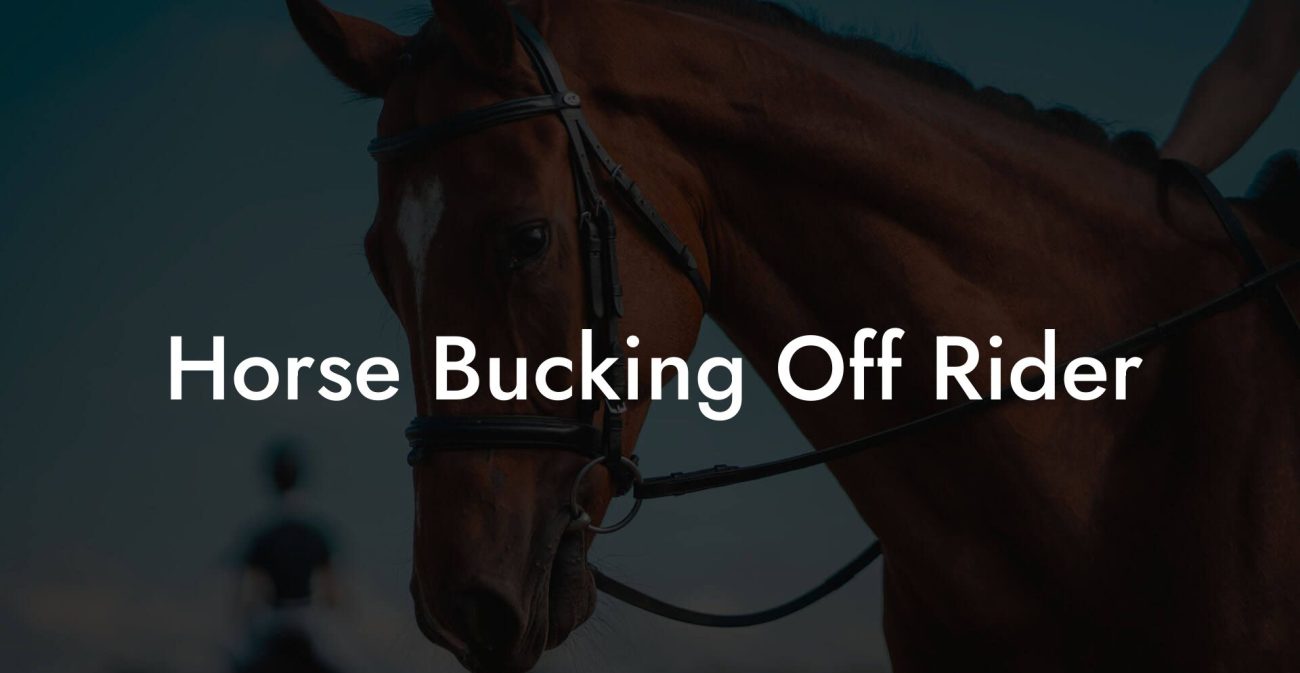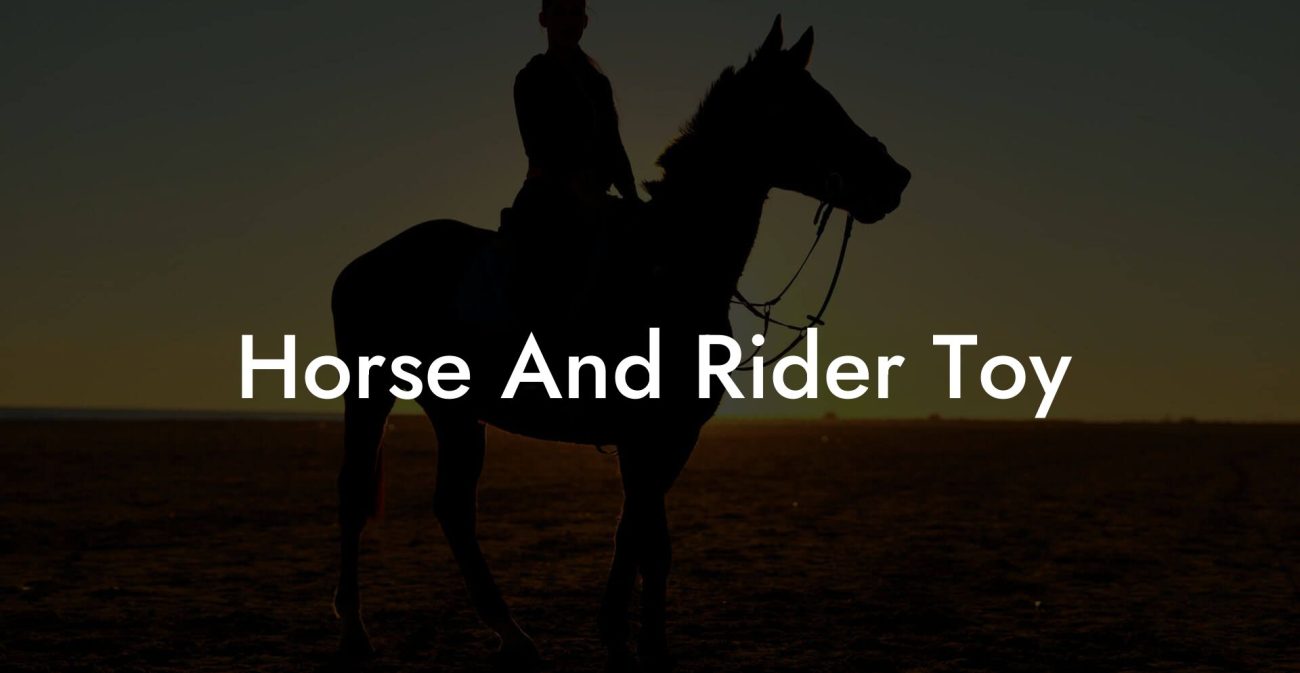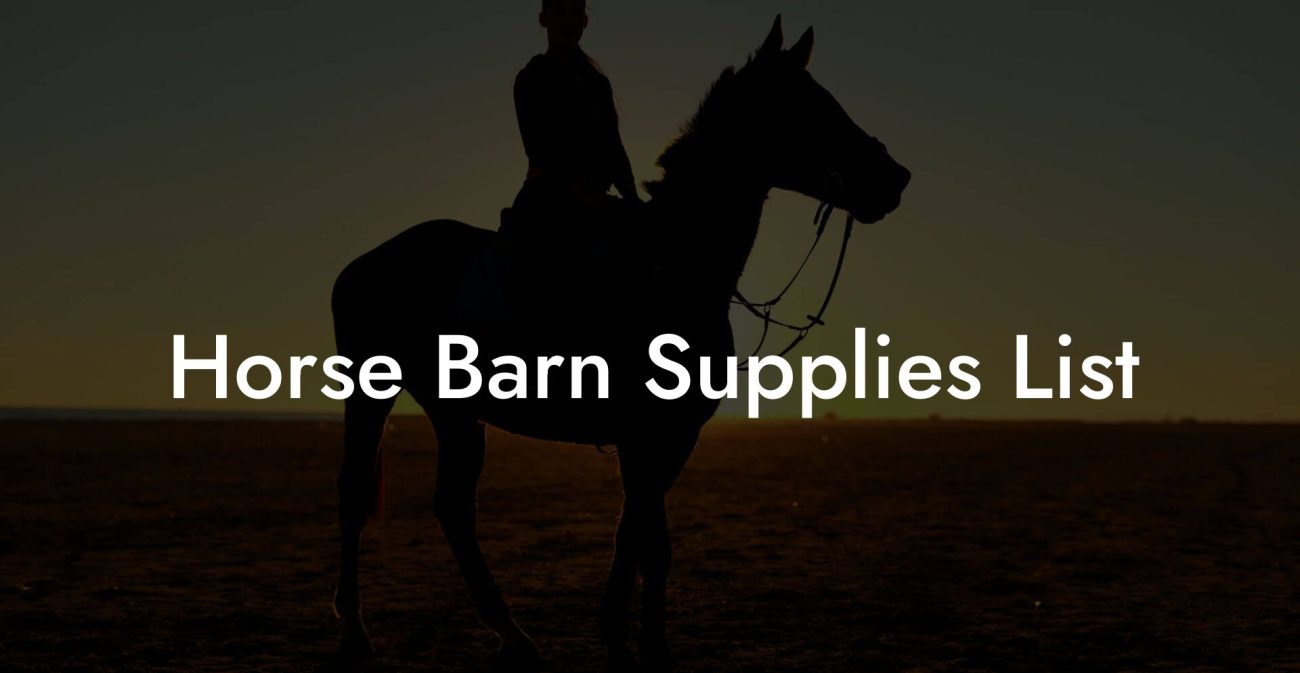Ever strolled past a barn and wondered why some horses sport the mysterious label “grade” instead of flaunting a fancy pedigree? Picture a spirited, freewheeling equine friend whose mixed heritage gives it character and endless charm, this is your grade horse. In today’s fast-paced world of equine care and riding culture, understanding what it really means when a horse is grade can be both an enlightening adventure and a practical guide to optimizing the care you give your animal companion.
Quick Links to Useful Sections
- Defining “Grade” in the World of Horses
- Grade Horses vs. Purebreds: What’s the Real Difference?
- The History Behind Grade Horses
- Debunking Myths About Grade Horses
- Myth 1: Grade Means Inferior
- Myth 2: They’re Poorly Trained or Ill-Tempered
- Myth 3: They Can’t Compete in High-Level Disciplines
- Evaluating a Grade Horse: What to Look For
- Caring for Your Grade Horse: Practical Tips and Techniques
- nutrition and Diet
- Exercise and Training
- Health Monitoring and Veterinary Care
- Training Techniques to Unleash Your Horse’s Potential
- Positive Reinforcement
- Desensitization Techniques
- Groundwork and Liberty Training
- Exploring the Versatility of Grade Horses in Various Disciplines
- Trail Riding and Leisure
- Competitive Sports
- Working and Ranch Horses
- Case Studies: Grade Horses that Became Champions
- Case Study 1: The Trailblazer
- Case Study 2: The Show Stopper
- Case Study 3: The Resilient Ranch Horse
- Expert Insights: Evaluating and Maximizing a Grade Horse’s Potential
- Resources and Community Support: Your Next Steps
- Frequently Asked Questions: What Does It Mean When A Horse Is Grade?
- Your Next Steps in Embracing the World of Grade Horses
Defining “Grade” in the World of Horses
When folks say a horse is “grade,” they’re generally referring to a horse that isn’t of purebred lineage or doesn’t come with a documented pedigree. Unlike registered horses, grade horses are often the result of mixed breeding, each carrying a unique blend of traits and quirks that make them, well, grade. But don’t let the term fool you: these horses can be just as talented, hardy, and lovable as their purebred counterparts.
In equine lingo, “grade” isn’t about being lacking or subpar; rather, it’s a descriptor that marks a horse's diverse ancestry. Many times, grade horses emerge from humble beginnings, sometimes born on farms where practicality and hardiness trump pedigree. For Gen-Z and millennial horse enthusiasts, the charm of a grade horse lies in its authentic, unfiltered history, a tapestry woven from various breeds that bestows both surprises and hidden gems.
There are a couple of reasons a horse might be labeled as grade. First, it could be that the horse’s parental history is unknown or unregistered, leaving its breed mix up for debate. Second, sometimes horses of mixed lineage are intentionally bred for specific qualities, sturdiness, endurance, or even a bold temperament, that may not align with traditional breed standards. In essence, being grade is an invitation to explore the unique potential and character of a horse.
Grade Horses vs. Purebreds: What’s the Real Difference?
The debate between grade horses and purebreds is as old as the equestrian sport itself. Purebred horses come with meticulously documented pedigrees that rast a long line of certified ancestors and are often bred for highly specific traits. In contrast, grade horses are more like the indie artists of the horse world, a bit rough around the edges but bursting with personality and resilience.
Here are some key differences you might notice:
- Heritage Verification: Purebreds have well-documented bloodlines, while grade horses come from mixed backgrounds or undocumented breeding histories.
- Physical Traits: Purebreds frequently adhere to certain standards in terms of conformation and appearance; grade horses, on the other hand, can look like a blend of several breeds, often resulting in a one-of-a-kind appearance.
- Performance and Temperament: While purebreds are often prized for their predictable traits in performance disciplines, grade horses might offer surprising adaptability and versatility, making them excellent for trail riding, working farm horses, or even competitive sports.
- Cost and Accessibility: Owing to their documentation and often higher demand, purebreds can be more expensive. Grade horses tend to be more budget-friendly and accessible, opening the door to more affordable horse ownership.
The intrinsic value of a grade horse can be tremendous, they have a storied past and can often outperform expectations when provided with proper care and training. Today’s equine enthusiasts appreciate the authenticity and diversity that grade horses bring to the equestrian community.
The History Behind Grade Horses
To truly appreciate a grade horse, it helps to understand the history behind why the term exists. In times past, horse breeding wasn’t always about eye-catching pedigrees or championship titles, it was about survival, utility, and resilience. Back then, the priorities were practical; a robust, adaptable horse was exactly what was needed, no matter its breed origins.
Rural farms and working stables often didn’t have access to the selective breeding programs that we see in modern registries. Instead, horses were bred for function: to haul heavy loads, to facilitate farm labor, or simply to trot alongside hardworking farmers. In these contexts, a “grade” horse was simply a product of its environment, a mixture that embodied the best traits from various breeds, honed by necessity and practical experience.
Over time, as the equestrian world shifted its focus toward competitive sports and aesthetic standards, the purebred market began to take shape. However, many of those old, hardworking grade horses continued to thrive in their niches, becoming the backbone of regional agricultural work and even excelling in unexpected sporting arenas. Their history is a testament to practicality, adaptability, and a spirit that defies rigid expectations.
Debunking Myths About Grade Horses
There are a few myths inherent in the stereotype of the grade horse, so let’s set the record straight:
Myth 1: Grade Means Inferior
Not at all. “Grade” simply refers to the absence of documented pedigree. Many grade horses possess incredible physical prowess and a temperament that rivals or even exceeds that of many purebreds. Their mixed genetic heritage can result in a delightful unpredictability, one moment they’re showcasing top-notch athleticism, the next, they’re surprising you with unexpected gentleness.
Myth 2: They’re Poorly Trained or Ill-Tempered
Training and temperament are more about the bond between horse and rider rather than genetics alone. Grade horses, like their purebred counterparts, benefit immensely from consistent, loving training and care. With the right rider, these horses can transform into reliable, well-behaved partners.
Myth 3: They Can’t Compete in High-Level Disciplines
While purebreds are often bred with competitive performance in mind, many grade horses have bucked the trend and excelled in disciplines from jumping to western trail riding. Their robust constitution and adaptability often give them an edge in endurance events and trail lamination.
These myths persist mostly because of old prejudices tied to pedigree status. Breaking away from these conventions allows us to see that quality in a horse isn’t solely measured by its registration status but by its spirit, health, and the care it receives.
Evaluating a Grade Horse: What to Look For
When evaluating a grade horse, the focus should be on its physical conformation, behavior, and potential rather than its registration documents. Here are some key factors to consider:
- Conformation and Structure: Look for a balanced build, strong joints, and proportional muscle development. A well-conformed grade horse can still have the athletic ability necessary for various riding activities.
- Temperament and Behavior: Spend time getting to know the horse. Is it responsive? Does it have a calm disposition or a fiery spirit? A good temperament is often a greater indicator of compatibility than pedigree labels.
- Health and Soundness: A thorough veterinary examination is essential. Check for any signs of lameness, respiratory issues, or other underlying health conditions that might require special care.
- Potential for Training: Some grade horses have untapped potential that only unfolds with proper training and care. Evaluate how the horse responds to basic commands, its level of curiosity, and its overall willingness to learn.
- Background and History: Even if detailed pedigree records are absent, try to gather any information about the horse’s previous care, usage, and environment. This knowledge can provide insights into its behavior and physical attributes.
By shifting the focus from pedigree to potential, you can uncover a world of opportunity with grade horses. Many of these horses have backgrounds steeped in hard work and resilience, qualities that can translate into impressive performance and longevity when nurtured correctly.
Caring for Your Grade Horse: Practical Tips and Techniques
Once you’ve decided to welcome a grade horse into your stable, the real fun, and challenge, begins: caring for a horse whose character is as mixed as its lineage. Here are some practical guidelines to ensure that your equine friend thrives:
nutrition and Diet
Maintaining a balanced diet is critical for any horse, but with grade horses, you might need to pay extra attention to their unique metabolic needs. A high-quality hay or pasture mix, complemented by grain where needed, will keep them energetic and healthy. Consider these pointers:
- Balanced Forage: Ensure that your horse’s primary diet comes from nutrient-dense forage. If available, variety in pasture grazing can improve digestive health.
- Supplementation: Depending on their workload and health, a vitamin and mineral supplement might be necessary to keep your horse in top form. Always consult your vet before introducing any supplements.
- Water Intake: Fresh, clean water is fundamental. Monitor their water consumption, especially in warmer climates or after strenuous exercise.
Exercise and Training
Grade horses can excel with the right exercise regimen. Their diverse backgrounds often lend well to a variety of disciplines. Here are a few strategies:
- Start Slow: Especially if the horse is new to your stable or trying a new discipline, begin with low-impact activities before progressing to more strenuous workouts.
- Consistency is Key: Develop a daily or weekly training schedule that incorporates both groundwork and ridden exercises. Regular sessions not only improve physical fitness but also foster a strong bond between you and your horse.
- Tailored Techniques: Since every grade horse is unique, consider working with a trainer who understands mixed-breed temperaments and can customize programs around your horse’s specific strengths and weaknesses.
Health Monitoring and Veterinary Care
Just like any other horse, grade horses require routine veterinary check-ups, dental care, and hoof maintenance. Regular farrier visits and proper grooming routines can prevent many common health issues. Keep these practices in mind:
- Regular Check-ups: Schedule periodic visits from your veterinarian to catch potential issues early.
- Vaccinations and Deworming: Stay on schedule with standard vaccinations and deworming protocols to protect your horse from common diseases.
- Hoof Care: A consistent farrier schedule helps prevent hoof problems. Whether your horse is competing or simply enjoying daily trail rides, healthy hooves are essential.
Caring for a grade horse is all about recognizing its individuality. Embrace its multifaceted nature, and customize your approach as you learn more about its quirks and capabilities.
Training Techniques to Unleash Your Horse’s Potential
Training a grade horse isn’t about imposing a strict routine; it’s about discovering the innate potential that lies within a blend of diverse genetics. Here are some modern, effective training techniques:
Positive Reinforcement
Much like training pets, positive reinforcement works wonders with horses. Reward-based training helps create trust and can lead to quicker learning, whether it’s mastering basic commands or complex maneuvers in competitive settings.
Desensitization Techniques
Grade horses may sometimes be more reactive or curious due to their varied backgrounds. Employing desensitization techniques (gradually exposing the horse to new environments or stimuli) can help mitigate nervousness and build confidence over time.
Groundwork and Liberty Training
Spending time on groundwork without a saddle builds the foundation of trust. Liberty training, which encourages the horse to move freely and respond to subtle cues, can be particularly effective. This method respects the horse’s natural instincts while nurturing clear communication between you and your equine partner.
These innovative training techniques not only enhance your horse’s performance but also create a stronger, more intuitive bond that transforms every ride into a shared journey of discovery.
Exploring the Versatility of Grade Horses in Various Disciplines
One of the most exciting aspects of grade horses is their surprising versatility. Thanks to their mixed heritage, these equines often excel in a variety of activities, from traditional trail riding and ranch work to competitive sports. Here’s a closer look:
Trail Riding and Leisure
Many grade horses are the unsung heroes of trail riding. Their hardworking lineage often means they have the stamina and calm demeanor needed for long, enjoyable rides through nature. For adventurers eager to disconnect from digital overload, a grade horse provides that refreshing sense of grounded freedom and tangible exploration.
Competitive Sports
It’s a common misconception that only purebreds can shine in the competitive arena. Grade horses have been known to excel in disciplines such as reining, endurance riding, and even jumping competitions. Their genetic diversity can sometimes result in greater adaptability, making them excellent candidates for high-performance events.
Working and Ranch Horses
In rural settings, grade horses often play critical roles on working ranches. Their surefootedness, strength, and versatility make them cherished partners in herding, plowing, and other farm duties. These horses, steeped in practicality, bring a work ethic and resilience that purebred show horses might lack.
Whether you’re in search of a dependable partner for weekend rides or an all-rounder for competitive pursuits, grade horses offer a refreshing mix of character, endurance, and practicality that can often surpass expectations.
Case Studies: Grade Horses that Became Champions
Nothing highlights the potential of grade horses like real-life success stories. Here are a few case studies that demonstrate how a mixed genetic background can be the catalyst for greatness:
Case Study 1: The Trailblazer
Meet Sierra, a spirited grade mare rescued from a small-town farm. Initially overlooked due to her undocumented lineage, Sierra’s true talent shone through when her new owner, an avid trail rider, recognized her natural endurance and calm temperament on long rides. Through patient training and heartfelt care, Sierra went on to compete in regional trail riding competitions, earning accolades and the admiration of seasoned riders. Her story illustrates that when given the proper care and training, grade horses can become champions in their own right.
Case Study 2: The Show Stopper
In another surprising twist, a seemingly unremarkable grade stallion named Maverick stunned the competitive arena by excelling in dressage and jumping events. Initially viewed as an underdog by traditional judges, Maverick’s versatility and eagerness to learn helped him overcome the odds. With dynamic training techniques and a supportive team behind him, Maverick’s career took off, proving that pedigree isn’t the only path to success.
Case Study 3: The Resilient Ranch Horse
On a working ranch in the heartland, a grade horse called Dakota became indispensable during harvest season. Known for his steady demeanor under pressure, Dakota not only assisted in herding cattle but also played the role of a therapy horse for stressed-out ranch hands. His resilience and adaptability, traits honed by a mixed heritage, transformed him into a local legend and a testament to the untapped potential of grade horses.
These stories slice through the traditional narrative, it’s not about the label, but what’s under the saddle. Each grade horse’s journey is a celebration of diversity, resilience, and the power of individualized care.
Expert Insights: Evaluating and Maximizing a Grade Horse’s Potential
As with any living creature, every grade horse possesses both inherent traits and areas of potential growth. Experts in equine behavior, veterinary care, and training agree that the key to unlocking a grade horse’s abilities is understanding and nurturing its unique makeup.
Equine specialists advise that when assessing a grade horse, take a holistic approach. Evaluate not only its physical condition but also its mindset and response to training routines. Some experts recommend using modern diagnostic tools like gait analysis and behavior evaluations to tailor a training program that enhances the horse's natural abilities.
For riders and owners in the Gen-Z and millennial crowd, this means moving away from status symbols like fully registered bloodlines and instead focusing on functional fitness, emotional intelligence, and the overall well-being of your equine partner. In short, investing in your grade horse is an investment in a relationship built on trust, innovation, and a shared love for riding.
Resources and Community Support: Your Next Steps
Whether you’re a first-time horse owner or a seasoned equestrian looking to explore new equine horizons, there’s a treasure trove of resources out there to help you and your grade horse thrive. Online communities, local riding clubs, and specialized veterinary services provide platforms where you can exchange tips, ask for advice, and share success stories.
Consider connecting with forums and social media groups that focus on unofficial and mixed-breed horse care, a space where genuine advice meets real-life experiences. From YouTube tutorials on specialized training techniques to blogs that spotlight inspirational stories of grade horses turning the equestrian world upside down, there’s plenty to explore.
Additionally, many equine centers now offer holistic care workshops that cover everything from nutrition and health care to psychological well-being and training innovations. These resources are perfect for riders who want to adopt a forward-thinking approach to horse care while also respecting the timeless bond between human and horse.
Remember, your journey with a grade horse is as unique as the animal itself. By tapping into community expertise, nurturing continuous learning, and embracing holistic approaches, you set the stage for a rewarding partnership that transcends labels. Take the next step, invest in knowledge, and discover the untapped potential that lies within every grade horse.
Frequently Asked Questions: What Does It Mean When A Horse Is Grade?
Below are some frequently asked questions to further clarify the world of grade horses and what you can expect when caring for one.
1. What exactly does it mean when a horse is referred to as “grade”?
A grade horse is generally one that does not have a fully documented pedigree or registration with a recognized breed registry. This often indicates mixed breeding or unknown parentage, though it doesn’t reflect on the horse’s quality, potential, or temperament.
2. How do grade horses differ from purebreds?
While purebreds come with well-documented bloodlines and conform to specific breed standards, grade horses are the result of mixed heritage. They often boast a blend of traits that can enhance versatility, making them ideal for various disciplines and everyday riding.
3. Do grade horses have the same potential as purebreds in competitive events?
Absolutely. Many grade horses have showcased exceptional performance in competitive sports like reining, endurance riding, and even jumping. Their adaptability and hard-wearing nature often make them surprising contenders that defy traditional expectations.
4. Can a grade horse make a good family pet?
Yes, the blend of mixed genetics can yield a horse with a gentle, charismatic demeanor, making them excellent family pets or companions for trail rides. Much of their temperament is shaped by their training and the care they receive.
5. What special care considerations are there for grade horses?
While their care is similar to that of any horse, you may need to pay special attention to their dietary needs, exercise regimen, and training techniques to maximize their natural strengths. Regular health checks and a consistent training routine can help ensure optimal performance and well-being.
6. How can I assess the potential of a grade horse before purchasing?
Focus on evaluating its conformation, temperament, and overall health. Engage a veterinarian or equine expert for a thorough assessment. Spending time with the horse in different settings can also help you gauge its responsiveness and training potential.
7. Are there any online resources specifically dedicated to grade horse care?
Yes, numerous online forums, social media groups, and educational websites focus on the care and training of mixed-breed or grade horses. These platforms offer valuable insights and community support from experienced riders and equine professionals.
8. What should I do if I want to learn more or seek professional advice?
Connecting with local equestrian clubs, specialized veterinarians, or trainers with a background in mixed-breed horse care can be incredibly beneficial. They can offer personalized advice tailored to your horse’s specific needs and your riding goals.
Your Next Steps in Embracing the World of Grade Horses
Embracing a grade horse is stepping into a journey of discovery, resilience, and sheer enthusiasm for all things equine. These horses invite you to look beyond pedigrees and documented lineages, challenging you to see the beauty in a rich, diverse heritage. As you embark on this equestrian adventure, remember that every grade horse carries a story, a narrative of hard work, struggle, and triumph that resonates with anyone who values authenticity.
Start by exploring local stables or rescue centers where grade horses are often waiting for someone ready to appreciate their potential. Dive into online communities dedicated to mixed-breed horse care, and connect with fellow riders who have discovered the magic of nurturing a horse without the frills of a purebred label.
Your journey won’t be just about riding, it will be about building a partnership grounded in mutual trust, continuous learning, and a shared passion for living life to the fullest. Equip yourself with knowledge, embrace innovative training techniques, and celebrate every small victory along the way.
With the right mix of care, training, and compassion, your grade horse can become a testament to the fact that true excellence isn’t defined by pedigree but by passion, perseverance, and a willingness to embrace the delicious unpredictability of life.
So saddle up, invest in your horse’s future, and become part of a vibrant community that cherishes diversity, both in horses and in the riders who champion them. Your adventure in the world of grade horses begins now!

